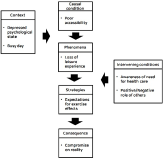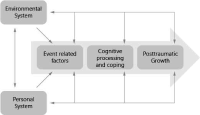PURPOSE This study was conducted to investigate changes in stress before and after elite shooting athletes participate in a match, and to find out the effect on the match score. METHODS Thirty-wight elite shooting athletes were sampled, questionnaires were distributed to measure psychological stress before and after the match, and saliva was collected before and after the match to measure cortisol. In addition, psychological stress and changes in cortisol before and after the game were investigated, and how psychological stress before and after the game and cortisol affect the score of the game were investigated. Accordingly, a statistical analysis based on data analysis was conducted, and the following research results were obtained. RESULTS The pre-match analysis of psychological stress and cortisol revealed statistically significant changes; both post-match stress and cortisol decreased compared to before the match. Increased psychological stress and cortisol both before and after the match had a negative effect on the match score. CONCLUSIONS These findings confirmed that shooters experience very strong psycho-physiological stress before the match, and the stronger the psychological stress, the lower the game score.
This study was to explore the factors influencing Olympic performance positively and negatively. In order to achieve this purpose, 60 athletes, who participated in 2012 London Olympic games, responded on open-ended questionnaire. In addition, 10 athletes, who won medals in London Olympic, responded on in-depth interview. Collected data were analyzed by deductive content analysis. The results of this study were as follows: firstly, the factors influencing Olympic performance positively were psychological preparation, strengthening training, physical conditioning, support from significant others, material support, cheering of Korean people, self respect as a Korean national athlete, different game environment, team cohesion, sharing Olympic experience, and support of sports science. Secondly, the factors influencing Olympic performance negatively were psychological pressure, excessive expectation, negative interpersonal relationship, condition decline, overtraining, unstable environment, insufficient facilitation, decrease in performance level, and especially ineffective village room placement and media management during Olympic period. Thirdly, the differences between Olympic games and other world competitions , perceived by athletes were competition scale, psychological attitude, training support, systematic preparation, and benefits from winning medals. The results of this study will give fundamental information in developing a scale which can measure Olympic preparation level and in developing Olympic preparation guideline. Therefore, it will help athletes ,who participate Olympic for the first time or athletes who did not perform well in pre-participated Olympic games, to understand and apply in training the factors influencing Olympic performance and help them to perform better in Olympic games.

Purpose: This study was to verify the relationship between coaching behavior(autonomy/controlling behavior), self-regulation motivation and performance. Method: 356 athletes (from middle to work and professional team) in individual and team sport completed coaching behavior scale developed by this researchers assessing autonomy and controlling coaching behavior perceived by players, Korea Basic Pyshoclogical Needs Scale (KBPNS) assessing basic psychological needs, Behavioral Regulation in Sport Questionnaire (BRSQ) assessing sports motivation level based on self-determination theory, and sport performance score. To estimate the relationship between coaching behavior, self-regulation motivation and performance, this study employed the structure equation modeling analysis. Results: The relationship between psychological needs, regulation motivation and performance showed that autonomy coaching behavior tend to reinforce competence and autonomy of player. These variables have a positive effect on more inner regulation motivation. Moreover, the intrinsic motivation through stimulation experience was a key factor leading to a positive performance by improving the performance strategy and skill of athletes. Conclusion: These results are meaningful as an empirical evidence that relationship between motivation and performance can be changed according to the type of coaching behavior, and that autonomous coaching behavior play an important role in maximizing the performance of player that provided theoretically form.


Purpose This study was designed to develop a team building program that helps freshmen student-athletes to adapt to college life and enhance team function and process and to examine the effects of this program. It could provide basic information of a team building program that effectively accelerates team function in the college team sports domain. Methods The program was developed through this process. First, an open-ended questionnaire was utilized to discover the needs of the program. Second, the results of needs of the program and important factors of team-building program were taken into consideration. Third, expert meetings were conducted. Consequently, the program consisted of three stages of total 10 sessions which was 90 min long. The questionnaires(Group Cohesion Questionnaire and Coach-Athlete Relationship Questionnaire), experience report, and program evaluation form were used as measures to identify the effects of the developed program. SPSS version 24.0 and inductive analysis were used to analyze the data. Results The results of this study are as follows. First, there was no statistically significant influence between developed program and the level of group cohesion. In contrast, the level of coach-athlete interaction was significantly increased. Second, the analysis of experience report revealed that this program reduced interpersonal conflict between team members and formed positive interpersonal relationship by mind of respect and consideration. Conclusion In conclusion, the hierarchical culture was strongly formed and team member suffered from the dual role of athlete and student in Korean college team sports. Thus, these should be resolved in order to enhance team function and process. As a results, this process could increase team performance as well as offer psychological stability to college student-athletes.


Purpose The purpose of this study is to investigate the alienation and the overcoming process of the physical activity participation of people with Adventitious Visual Impairment(AVI) Methods 21 Adults with AVI were recruited and one on one semi-structured interview was conducted. Ground theory was used to analyze the data. Member check, peer debriefing was conducted to enhance the trustworthiness of this study. Results As a result, a total of 203 concepts were derived. This consisted of 21 subcategories and the common themes of the subcategories were categorized into nine categories. Specific results are as follows. First, the physical activity of people with AVI was directly affected by the sports facilities, physical activity programs, and professional instructor. This causal condition resulted in the loss of leisure experience in the context of the busy daily life and the depressed psychological state. Second, due to the perceived need of health care and the positive involvement of others, people with AVI came to expect the effect of exercise. Third, people with AVI participated in physical activity again as a tool to achieve the purpose of health improvement. This type of physical activity has a limitation that it can not guarantee the continuity of physical activity due to the limitation that it does not contain autonomy and interest of people with AVI. Conclusions Based on these results, the following suggestions were made. First, it is necessary to improve the environment for ensuring participation in physical activity of people with AVI. Moreover education and promotion of the effects and values of the exercise should be carried out for people with AVI and their guardians. Second, it is necessary to diversify physical activity types and reconstruct existing exercise programs.


[Purpose] This study attempted to provide a literature review of the research on posttraumatic growth and to propose a revised model which mainly explain the relationships among serious leisure, posttraumatic growth, health, and happiness. The concept of psychological growth following a traumatic life event is most commonly referred to as posttraumatic growth in the literature and was first coined by Tedeschi and Calhoun (1995). It can be postulated that such experiences can lead to a richer appreciation for life, more compassion for others, closer relationships with others, better understanding of one's potentials and possibilities, and stronger religious faith. [Methods] The purposes of this study were achieved by (1) reviewing the posttraumatic growth and its relationship to serious leisure; (2) analyzing recent posttraumatic growth related models; and (3) proposing a revised posttraumatic growth model and a research agenda to further progress posttraumatic growth research. [Conclusions] Although there is an abundance of evidence for the existence of posttraumatic growth, its nature as well as benefits in relation to participation in serious leisure remain very partially understood. This study proposes a revised model for understanding the process of porsttraumatic growth in which serious leisure and cognitive processing play a significant role. Important implications of the relationships between serious leisure and posttraumatic growth are mainly discussed, alongside recommendations for future research.


